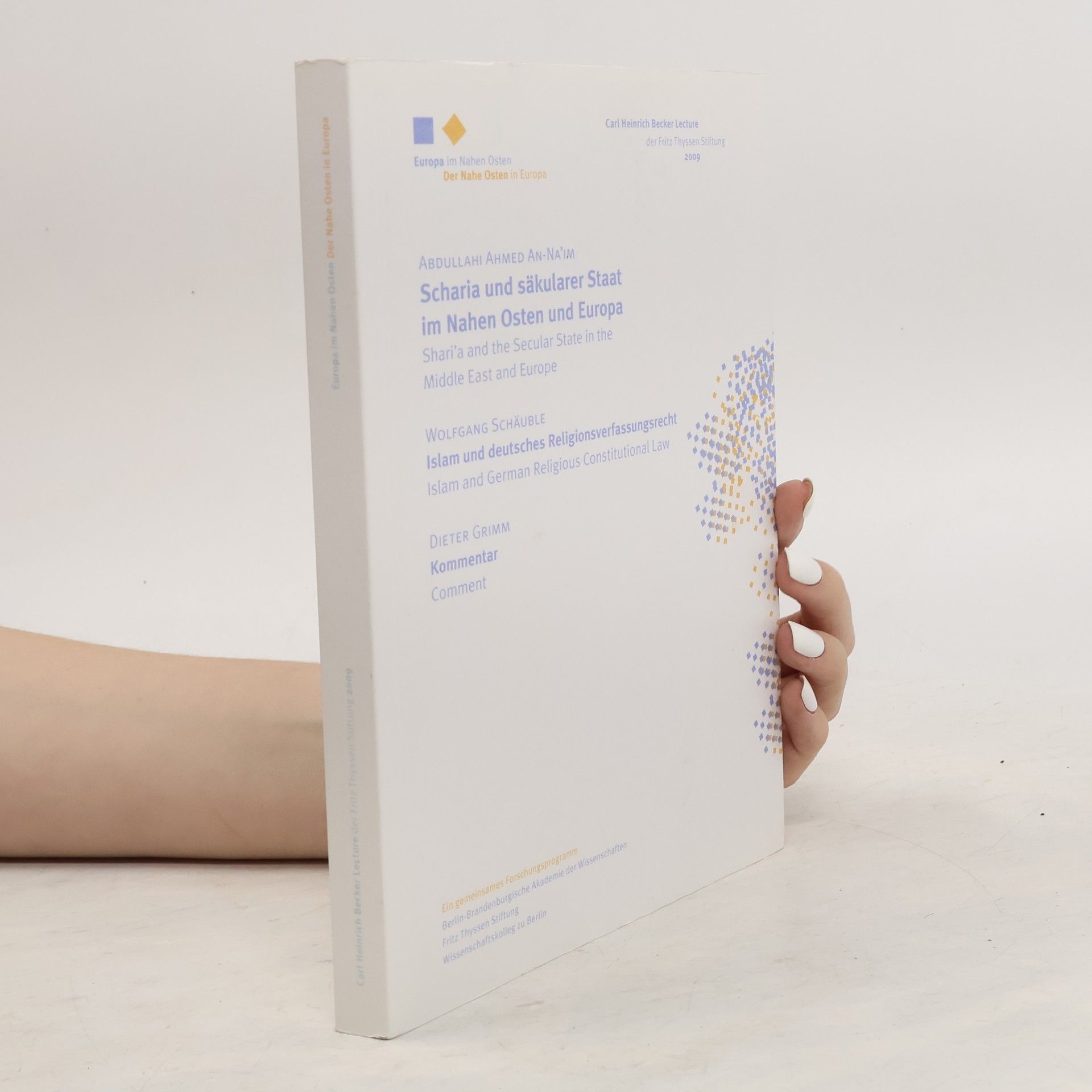Das neue nationale Kulturgutschutzgesetz ist umstritten. Untersucht wurde es bisher fast ausschließlich unter rechtlichen Gesichtspunkten. In diesem Buch arbeiten Kunsthistorikerinnen und Rechtswissenschaftler erstmals gemeinsam und auf der Grundlage von umfangreichen Archivstudien die folgenreichen Anfänge des Abwanderungsschutzes auf und evaluieren den Nationsbegriff des Gesetzes und die impliziten Bewertungskriterien für "national wertvolles Kulturgut" in der Praxis. Sie identifizieren dabei wiederkehrende Konflikte und entwickeln Vorschläge für Vollzug und Reform des Gesetzes.
Wolf-Dieter Grimm Book order (chronological)
Dieter Grimm is a German lawyer and former Supreme Court Justice, also authoring several works relating to the law. His writings delve deeply into legal questions and their societal impact. Grimm offers a penetrating look at the evolution of legal thought and its application in the modern world. His texts are valued for their expertise and clarity.






Die Historiker und die Verfassung
Ein Beitrag zur Wirkungsgeschichte des Grundgesetzes
Die Geschichte der Bundesrepublik Deutschland ist stark durch das Grundgesetz und die Rechtsprechung des Bundesverfassungsgerichts geprägt, doch Historiker berücksichtigen dies oft unzureichend. Dieter Grimm, der von 1987 bis 1999 Richter am Bundesverfassungsgericht war, beleuchtet, wie eine ausführlichere Auseinandersetzung mit Verfassung und Verfassungsrechtsprechung das Verständnis der historischen Entwicklung bereichert hätte. Sein scharfsinniges Werk trägt zur bisher fehlenden Wirkungsgeschichte des Grundgesetzes bei. Die positive Entwicklung der Bundesrepublik wird häufig dem Grundgesetz zugeschrieben, doch in den umfassenden Darstellungen der Geschichte findet sich dieses Urteil nicht ausreichend wieder. Grimm zeigt auf, dass die Berücksichtigung der Verfassung und der Entscheidungen des Bundesverfassungsgerichts für das Verständnis der von Historikern beschriebenen Ereignisse und Entwicklungen entscheidend gewesen wäre. Das Buch schließt eine Lücke zwischen Rechts- und Geschichtswissenschaft: Während die Rechtswissenschaft die Wirkungen der Verfassung im Rechtssystem untersucht, bleibt die Geschichtswissenschaft an der Anwendungsebene des Rechts stehen, wo sich entscheidet, ob und wie der normative Anspruch der Verfassung eingelöst wird.
Grundrechtsfunktionen jenseits des Staates
- 122 pages
- 5 hours of reading
Wie entwickelt sich das Recht in Zukunft? Welches Recht findet der Jurist in der Zukunft vor? Welche Regelungsaufgaben sind absehbar und welche rechtlichen und methodischen Innovationen wurden sie verlangen? Wie keine andere rechtliche Institution ermoglichen Grundrechte normative Lernprozesse. Die Aufsatze von Dieter Grimm (Hauptreferat) und Anne Peters (Kommentar) blicken deswegen auf die Errungenschaften von Grundrechten und auf ihre Zukunft jenseits des Staates.
Recht oder Politik?
Die Kelsen-Schmitt-Kontroverse zur Verfassungsgerichtsbarkeit und die heutige Lage.
- 51 pages
- 2 hours of reading
Im Zentrum der Auseinandersetzung steht der Konflikt zwischen Hans Kelsen und Carl Schmitt über die Rolle von Verfassungsgerichten. Kelsen betrachtete diese als essenziellen Bestandteil einer Verfassung, während Schmitt eine alternative Auffassung vertrat und die Verfassungsgerichtsbarkeit ablehnte. Die Gründung zahlreicher Verfassungsgerichte in der zweiten Hälfte des 20. Jahrhunderts schien Kelsen zu bestätigen, doch im 21. Jahrhundert wächst die Kritik erneut, die das Spannungsfeld zwischen Recht und Politik beleuchtet. Die Schrift bietet eine tiefgehende Analyse dieser Thematik.
Lektüre und Geltung
Zur Verstehenspraxis in der Rechtswissenschaft und in der Literaturwissenschaft
Ich bin ein Freund der Verfassung
Wissenschaftsbiographisches Interview von Oliver Lepsius, Christian Waldhoff und Matthias Roßbach mit Dieter Grimm
- 325 pages
- 12 hours of reading
Dieter Grimm ist einer der führenden Gelehrten des Öffentlichen Rechts und einer der wichtigsten juristischen Zeitzeugen der Bundesrepublik. Er hat nicht nur in herausgehobener Funktion an der deutschen Rechtsentwicklung mitgewirkt und über sie nachgedacht, er ist auch ein international wahrgenommener Beobachter und Themensetzer. In diesem wissenschaftsbiographischen Interview berichtet er über Erfahrungen und Hintergründe, die weder in Gerichtsentscheidungen noch in wissenschaftlichen Publikationen zur Sprache kommen.
Europa ja - aber welches?
Zur Verfassung der europäischen Demokratie
Die Europäische Union hat keinen Mangel an Kritik und Akzeptanzproblemen – doch die Ursachen werden häufig an der falschen Stelle gesucht. Während viele hoffen, dass sich durch eine Ausweitung der Kompetenzen des Europäischen Parlaments das Demokratiedefizit der Union beheben lässt, zeigt Dieter Grimm, warum diese Hoffnung trügt. In grundsätzlichen Erörterungen und Einzelstudien zeigt Grimm, einer der renommiertesten deutschen Rechtswissenschaftler, dass eine Ursache für die starken Akzeptanzprobleme meist übersehen wird, nämlich die Verselbständigung der exekutiven und judikativen Organe der EU (Kommission und Europäischer Gerichtshof) von den demokratischen Prozessen in den Mitgliedstaaten und der EU selbst, die ihre Wurzel wiederum in der vom Gerichtshof vorgenommenen „Konstitutionalisierung der Verträge“ hat. Er geht den Ursachen für diese problematische Entwicklung nach und bietet Vorschläge zu ihrer Korrektur an.
Scharia und säkularer Staat im Nahen Osten und Europa / Schari'a and the Secular State in the Middle East and Europe
Carl Heinrich Becker Lecture der Fritz Thyssen Stiftung 2009
- 177 pages
- 7 hours of reading


